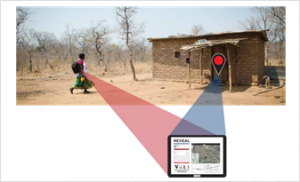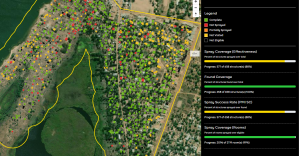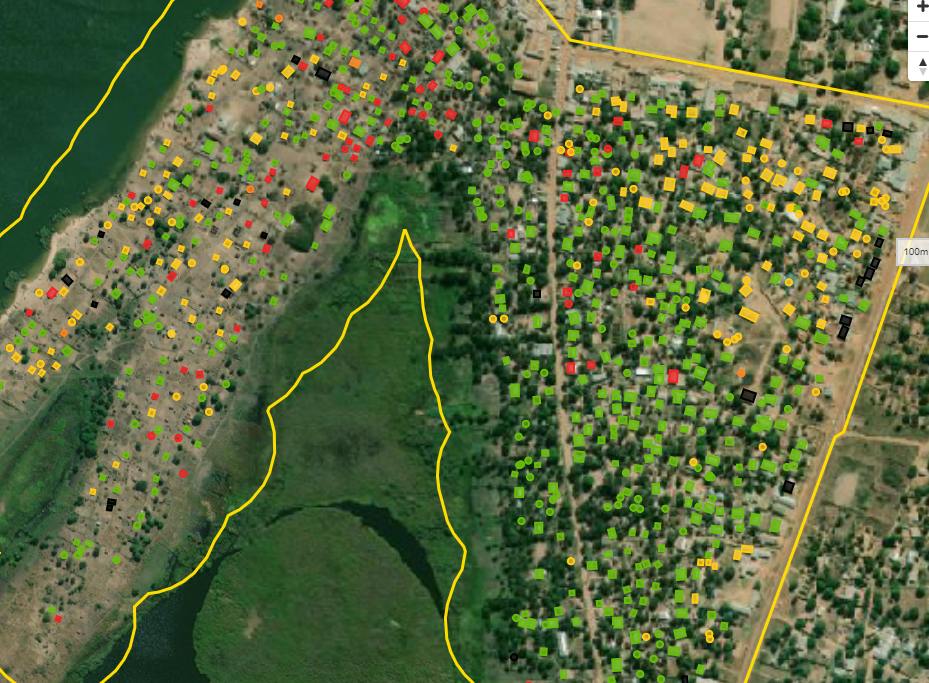
Since 2013, Malaria Consortium has led the distribution of seasonal malaria chemoprevention (SMC) in Nigeria, with the intervention reaching over 4 million children in 2019. Inaccurate target population estimates and the use of paper-based monitoring platforms are major challenges in effectively planning, delivering and tracking mass health campaigns like SMC. Population estimates are used to help plan how many antimalarial medicines are required and how many community distributors (CDs) are needed to deliver them to children. SMC coverage data are used to monitor programme performance and take corrective action. Poor quality data can affect the intervention’s coverage and equity, potentially leaving the poorest and most vulnerable behind.
Malaria Consortium is working with Akros to pilot the use of a geospatial platform called Reveal to support the planning, delivery and tracking of SMC in northern Nigeria. The platform, a web-based application, will use satellite imagery to generate maps of target intervention areas and guide community distributors (CDs) in the field. Knowing the precise location of where residential structures are located has the potential to enable CDs to reach and distribute antimalarial medicines to more children, including in hard-to-reach areas. It is anticipated to facilitate precise planning and monitoring of the campaign through more accurate target population estimates, tracking stocks of medicines and other commodities, and monitoring CD performance.
It is essential that the Reveal platform is carefully aligned with the current SMC in-field workflows if it is to be comprehensively adopted and utilised effectively. To achieve this alignment, two main activities were undertaken: 1) data discovery and mapping exercise; 2) a remote validation workshop.
How was this achieved?

Between February and March 2020, Akros facilitated an in-depth data discovery and mapping exercise to understand and document information related to key stakeholders involved in SMC, the workflow of the SMC campaign and how data tools are used throughout SMC workflows. Seventeen key stakeholder consultations were held in Nigeria which elucidated information for thirteen workflows relevant to the SMC campaign. These workflows describe how data are captured in the field, how activities such as training, sensitization, supervision and distribution and conducted, and how performance is monitored. Workflows between stakeholders at each level (community, health facility, ward, local government area, state and national) were also mapped out.
The next step was to validate these workflows to help develop collection forms and dashboards that will appear in the Reveal tool. Originally, this was planned as a face-to-face workshop but due to worldwide restrictions on travel from the global COVID-19 pandemic, the teams conducted the process over teleconference. In April 2020, teams in Nigeria, Zambia and the UK came together in a two-week remote workshop to discuss and validate each step of SMC campaign, for Akros’ developers to translate into an online platform.
Insights from the workshop
Imagine you are a CD entering a rural community in northern Nigeria. To effectively distribute SMC to children, you need to know which structures are residential with eligible children living there, and which are other types of buildings such as shops or places of worship. During the workshop, Malaria Consortium and Akros discussed key features of data collection forms in the platform to allow CDs using Reveal to record this information. Decisions included: What colour will residential buildings appear on a map in the platform? How will the platform capture data about multiple families living in a single compound? How will the CD record newly built structures between SMC cycles?

Now imagine you are a supervisor of CDs for the campaign tracking progress and performance of your team. What essential indicators on SMC coverage, CD performance and in-field operations (e.g. drug stocks) would you like to see on the web dashboard? For example, teams discussed the importance of tracking the CD’s adherence to hygiene practices in light of the COVID-19 pandemic. They also decided on the thresholds for indicators that would alert supervisors to take further action to improve performance within the four-day monthly SMC distribution period.
Next steps
These critical decisions will now be taken forward by the development team at Akros to build the first version of the platform. This “minimum viable product” will be tested towards the end of the SMC season in 2020, by 19 CDs and their supervisors working across two health facilities. Lessons learned from this pilot will be used to refine the platform to be rolled out across one local government area with over 400 CDs, in the SMC season in 2021.
Charlotte Ward is Senior Research Specialist at Malaria Consortium
Header image credit: Akros
